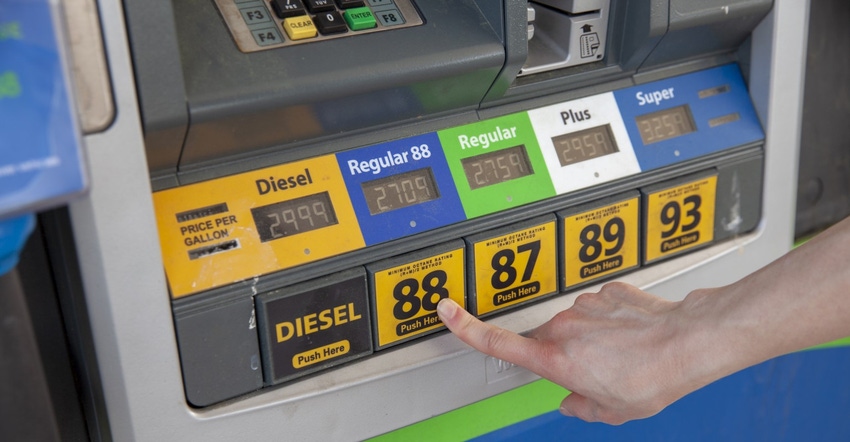
Deputy Under Secretary for Rural Development Justin Maxson announced that USDA is investing $26 million to build infrastructure to expand the availability of higher-blend renewable biofuels, such as E15 and flex fuels such as E85, by 822 million gallons annually in 23 states.
USDA is making the awards under the Higher Blends Infrastructure Incentive Program. The announcement includes investments in 23 states including California, Connecticut, Florida, Georgia, Illinois, Indiana, Iowa, Kansas, Kentucky, Maine, Massachusetts, Michigan, Mississippi, Missouri, Nebraska, New Mexico, New York, North Carolina, Ohio, Oklahoma, Rhode Island, Texas and Wisconsin.
The announcement marks the one-year anniversary of the Higher Blends Infrastructure Incentive Program. To date, USDA has invested $66.4 million for projects that are expected to increase biofuels sales by 1.2 billion gallons annually.
Through this program, USDA helps transportation fueling and biodiesel distribution facilities offer higher ethanol and biodiesel blends to customers by sharing the costs to install fuel pumps, equipment and infrastructure.
“Investments like these increase opportunities for American consumers to make climate-smart decisions and move the country closer to President Biden’s goal of net-zero carbon emissions by 2050,” Maxson says. “By expanding the availability of higher-blend biofuels, we’re giving consumers more environmentally friendly fuel choices when they fill up at the pump and stimulating an important market for U.S. farmers and ranchers.”
In California, AltAir Paramount LLC will use a $1.5 million grant to install a pump, safety infrastructure and piping at its fuel distribution facility. Funds will also be used to retrofit and upgrade a biodiesel storage tank. This project is expected to increase biodiesel sales by 135 million gallons per year.
In Ohio, United Dairy Farmers Inc. will use a $634,000 grant to replace 21 dispensers and four storage tanks at four fueling stations. The company also will install 13 dispensers at two more fueling stations in Ohio and Kentucky. This project is expected to increase ethanol sales by 4 million gallons per year.
In North Carolina, Zenith Energy Terminals Holdings LLC will use a $614,930 grant to install a truck rack biodiesel blending system at a fuel distribution facility. This project is expected to increase biodiesel sales by 24 million gallons per year.
The National Biodiesel Board notes the funding for 12 projects from California to Connecticut will support nearly 771 million gallons of biodiesel per year. Moreover, the combined projects will reduce the nation's carbon emissions by more than 7.2 million metric tons each year at a cost of less than $2.25 per ton.
"The biodiesel industry provides Americans cleaner, better fuels for transportation and home heating. Biodiesel reduces carbon emissions on average by 74% and considerably cuts particulate matter and other criteria pollutant emissions, which can generate immediate health care savings," says Kurt Kovarik, NBB's vice president of federal affairs. "Updating America's infrastructure to expand consumer access to low-carbon biodiesel and Bioheat fuel is a low-cost, high-return investment in meeting the nation's goals for near-term carbon reductions.”
Renewable Fuels Association President and CEO Geoff Cooper adds the grants announced by USDA today will help facilitate the continued expansion of lower-carbon, lower-cost fuel blends like E15 and E85.
“RFA is proud to have assisted many of these retailers and marketers in identifying their equipment needs and preparing their grant applications. We look forward to continuing to work with these innovative retailers as their projects enter the next phase,” Cooper says.
RFA also thanked USDA and Secretary of Agriculture Tom Vilsack for continuing to prioritize this important program. “Secretary Vilsack clearly understands that renewable fuels like ethanol should play a key role in the Biden administration’s strategy to decarbonize the transportation sector and achieve net-zero greenhouse gas emissions by 2050,” Cooper says.
About the Author(s)
You May Also Like






